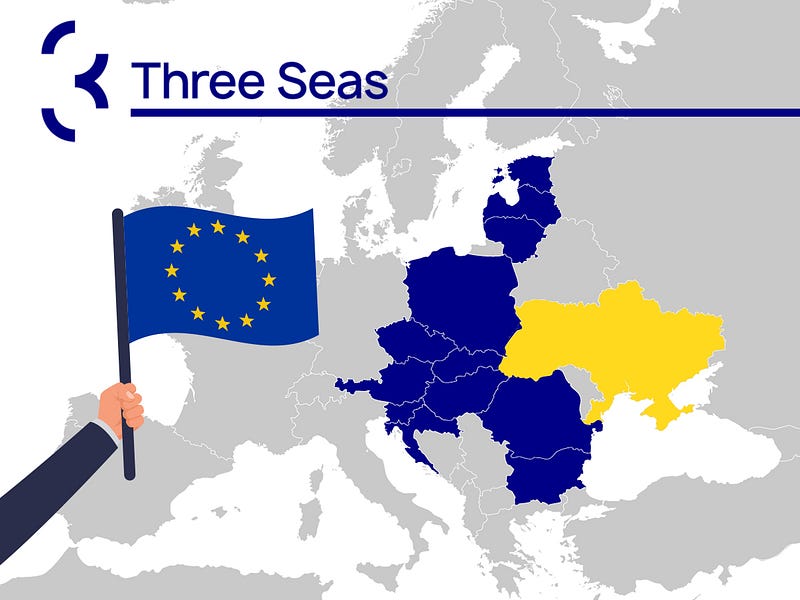
Amid the currently forming geopolitical situation on the Eastern flank of Europe, in addition to the generously offered European candidacy status, Kyiv received another gesture from the Central and Eastern European member states of the European Union, which announced that they will open the way for the war-torn country to join the Three Seas Initiative (TSI).
TSI is a regional cooperation organization which currently brings together 12 states from Central and Eastern Europe, including the Baltic states as well (Austria, Croatia, Slovenia, Hungary, Romania, Bulgaria, Czechia, Slovakia, Poland, Estonia, Lithuania, Latvia). The purpose of the TSI is to stimulate economic development and partnership in the region.
According to official Ukrainian statements, by using the capacities of the Poland-Slovakia and Poland-Ukraine interconnectors, Kyiv offered its electricity exports to the member states of the TSI, as well as Ukraine’s huge gas storage capacities, saying that this can be Ukraine’s contribution to the struggle of the member states to become independent from Russian energy resources.
But what advantages can Kyiv get with TSI? On the one hand, being a partner country of this significant format of regional cooperation allows Ukraine to feel the proximity of the European perspective. Moreover, TSI can be interpreted by the Kyiv leadership as a fact that the European Union is only in a few steps distance, which may be the key element of President Zelenskiy’s communication with his nation. From the point of view of communication, Ukraine’s approach to TSI is definitely an ace of spades.
On the other hand, in addition to the flashy European perspective, which indeed is nothing more than a mere phrase, that can be used for communication purposes, the high value of TSI lies in its geographical location. Just have a look at the map and you will immediately understand what Zelenskiy meant when he said that ’it is the states of the Three Seas that are our connection to the free world. The supply of weapons to Ukraine, the supply of fuel, the preservation of vital transport flows, green corridors for the export of Ukrainian food, the migration of people — all this works through the territory of the member states of this initiative’, he added.
On behalf of the TSI member states, not a single word about democracy, fundamental rights, elimination of oligarchic conditions, etc. which are usually mentioned as basic requirements Ukraine must meet. And, for Ukraine, all this is about transit routes of the arms’ supplies… Considering that Warsaw is the strongest and loudest (and last, but not least, effective) supporter of Ukraine regarding its membership in the regional cooperation format, Kyiv should be very grateful for Poland for its support, as this clearly appears in the fact that Polish citizens have recently been granted additional rights in Ukraine. I cannot help but associate this with the unthinkable insanity of introducing the English language as state language in Ukraine. For me, a representative of a multi-million ethnic minority which was stripped of the fundamental right to speak freely in its native language in its own country, this is a shame. I believe that other ethnic groups in Ukraine feel the same way.
From point of view of Romania, Bulgaria and Hungary, Ukraine’s approach to the Three Seas Initiative can serve as an excellent opportunity to make Ukraine accountable for the rights of national minorities. In exchange for supporting Ukraine, including the provision of free access to grain exports, as well as the supplies of weapons and fuel, and the billions of euros, offered for Ukraine for the post-war reconstruction, these three countries now have every right to demand from Kyiv some extra rights for their ethnic groups living in Ukraine, and, in parallel, in the new circumstances, in my opinion, an extra responsibility was laid upon the Poles in the field of helping other peoples to return guarantees of basic ethnic rights.
If this particular issue would be included in TSI’s agenda in the near future, it would be a hope not only for the minority communities of the afore-mentioned nations in Ukraine, but also for those tens of millions of ethnic Russians who, like millions of Ukrainians, were forced to flee Ukraine.
If the European perspective of Ukraine is something more than a great promise, let’s take it seriously and look at TSI as an entry point into the EU! In this case, the task of TSI would be to teach Ukraine the European style, and explain democracy. Despite the extremely complex interdependence in the region, and very difficult geopolitical and economic situation, the member states of the Three Seas Initiatives have a unique opportunity to do this favour themselves and Europe. And, believe me, no one will call it a political blackmail.
Leave a Reply